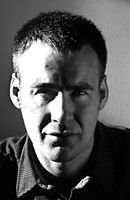 John Stiles, pictured here, whose work I included in my recent survey of the best Canadian poets under the age of 40 in New American Writing, has come out with his second collection of poems from Insomniac Press lately - Creamsickle Stick Shivs.
John Stiles, pictured here, whose work I included in my recent survey of the best Canadian poets under the age of 40 in New American Writing, has come out with his second collection of poems from Insomniac Press lately - Creamsickle Stick Shivs.The title refers to the evil lurking in the hearts of choirboys everywhere, and the third section chronicles the darkest thoughts of a poet working in a Church Charity Office, who masks his despair and disgust with Richard III's eloquence.
This is a very strong collection. Anyone who wants to know where Canadian poetry is going to go in the next decade should read it. More to the point, it is an exceptionally honest, bracing, funny, angry and raw book - and anyone who is tired of reading poetry that is bloodless or constrained should turn to Stiles to have their socks blown off - the man writes like we sometimes imagine The Beats did - only better - he has a sort of Henry Miller swagger, and tenderness. What I say about Higgins holds true for him, too - his voice, his style, are so unique as to offer a challenge to the idea that poetry has a sanctioned diction whatsoever.
Stiles - who originates from rural Nova Scotia (Port Williams) - opens the collection with a section that presents dramatic monologues in stark, challenging, and utterly musical local patois - and their skewed, drunken lilt is Faulknerian - these are dispossessed lovelorn luckless folk, passionate as all get out, and roaring to grab a chunk of life.
There are a few poems in this collection that variously slip between language poetry, and the purest form of self-confession possible, and the cracks in the vase are hard to find. Well-wrought? Hell, no. Powerful as a poke in the eye? Yessir. This one is great.
http://www.insomniacpress.com/title.php?id=1-897178-18-2
Comments